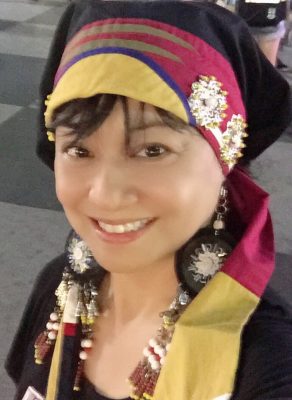
Photo of Mulihay Talus
As part of a new social media campaign to celebrate linguistic diversity online throughout Asia, every week a different language activist and advocate will be taking turns managing the @AsiaLangsOnline [1] Twitter account to share their experiences with the revitalization and promotion of their native languages. This campaign is a collaboration between Rising Voices [2], the Digital Empowerment Foundation [3], and the O Foundation [4].
Each week, the upcoming host will answer several questions about their background and will give a brief overview of their language. This Q&A is with Mulihay Talus (@Kau_Jasmine1126 [5]) who will provide a sneak preview of what she will be discussing during her week as host.
Rising Voices: Please tell us about yourself.
我是撒奇萊雅族的茉莉海.達露斯,來自花蓮。一歲時母親過世,由阿美族的外婆撫養長大,所以我的母語是阿美語。1990 年,父親開始參與撒奇萊雅族的正名運動,也讓我開始思索:我到底是誰?但父親在正名運動中因積勞成疾,已於 2006 年離開人世。為了繼承他的遺願,我也一直積極參與撒奇萊雅語言及文化的推廣。
I am Mulihay Talus of Sakizaya from Hualien. After my mother's death, I was raised by my Amis maternal grandmother and Amis became my mother tongue. In 1990, my father got involved in the status recognition/recertification movement of Sakizaya that made me wonder about ‘Who am I?’ My father passed away in 2006 after falling ill due to his dedication and hard work in the movement. To continue his legacy, I too became involved in the promotion of our language and culture ever since.
RV: What is the current status of your language on the internet and offline?
撒奇萊雅族於 2007 年一月十七日成功正名,成為臺灣原住民的第十三族,已經超過十年了。雖然現在持續地在進修族語,希望能讓族語更精進,但是在目前居住的地方,是沒有使用族語的環境,所以不管學習的心有多強烈,也只能在上課的短短三小時裡使用族語。
More than 10 years ago, on January 17, 2007, Sakizaya was eventually recognized as the 13th indigenous group of Taiwan. Although I have continued on bettering my grasp on the language, there are no opportunities to use this language in my day-to-day environment. Therefore, as much as I wish to improve my language, I can only put it to use during the class that runs for three hours each.
RV: On what topics do you plan to focus during the week that you’ll manage the @AsiaLangsOnline Twitter account?
撒奇萊雅族曾因「達部固灣戰役」而附歸在阿美族下達 120 年之久,雖然終於在 2007 年獲得正名,但是許多的部落文化及語言都是一片空白,有待復興。很開心剛好有這個機會擔任客座主持,希望能夠把撒奇萊雅族的「歲時祭儀」、「族群服飾」、「神說故事」、「部落產業」的各種風貌,介紹給全世界。
Ever since the Takubuwan Battle, the Sakizaya people were dispersed into the neighboring communities of the Amis. Sakizaya had since then lost its own identity for 120 years, until 2007. However, there remains a void to be filled by the revitalization of its language and tribal culture. I am really happy for this opportunity to become one of the guest hosts and am hoping to introduce celebrations, costumes, folklore, as well as tribal industries of Sakizaya to a global audience.
RV: What are the main motivations for your digital activism for your language? What are your hopes and dreams for your language?
我從事媒體業,平時的工作就與原住民族語傳播有關。這次昔日同事相邀,當然要好好把握機會,把自己的族語、文化介紹給更多人知道。沒有語言,一個族群就會滅亡!現在台灣的原住民族委員會已把許多資源都放到了網路上,方便大家隨時學習。除了假日進修之外,我平常也會和家人練習,希望能在生活中打造一個說族語的環境,更進一步推動族語傳承。
I work in the media and my job has to do with mass communication about the indigenous culture and language. When a former colleague reached out, I knew I had to take this opportunity to share my language, my culture for more people to know. Without its own language, an ethnic group will die out! Now that Taiwan’s Council of Indigenous Peoples have curated quite some online resources for public access, it’s easy for anyone to study the languages as they wish. Besides weekend classes, I practice Sakizaya with my family as well in the hope to create an environment of speaking the language in daily life and to pass it along to the next generation.